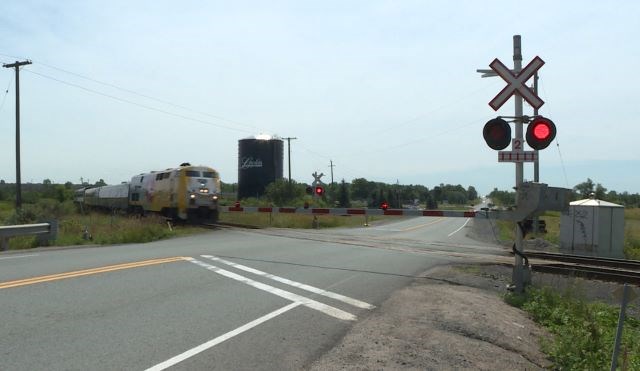THUNDER BAY – The assets in question are the maintenance of the roads, tracks, and guards at crossings where vehicles and trains meet.
At the Association of Municipalities Conference earlier this month Northern Ontario Municipal Association talked with provincial leaders about what can be done about for-profit railway companies randomly invoicing municipalities for maintaining right-of-way properties.
“Municipalities don’t get any say in that maintenance work,” said Wendy Landry, President of NOMA. “We are just trying to have a conversation about how we get invoiced without any plans. We get surprised invoices upwards of $186,000 to $200,000 sometimes. Those are not necessarily budgeted ahead of time so sometimes we are caught off guard.”
What municipality leaders are asking provincial leaders to do is to look into the way municipalities are invoiced for maintenance on railway assets. Other crown corporations pay for maintaining their assets while municipalities are invoiced by these for-profit corporations for maintaining right-of-way crossings.
“We think that the corporation should be paying for their own maintenance. It’s their assets. It’s not our assets,” said Landry.
As for railways taxation, municipal leaders discussed the pros and cons of taxing rail companies based on a per tonne-mile concept that is consistent with other provinces.
At the moment, railways companies do not pay taxes for the use of crown land.
“We had a really good conversation with the government,” said Landry. “Minister Rickford had some really good ideas and just pondering what are the best-case scenarios with regard to how we are taxing railway corporations, because in Ontario, we tax them per mile and in other provinces, they tax per tonne. It was a really fruitful conversation on which way was the best way because Ontario is huge. We have a lot of miles in-between our municipalities. But the flip side of that is when we talk about the town of Fort Frances which has 30 trains per day go through their town and they lost like six million dollars in taxes from their mill.”
When it comes to whether or not railways taxation should adopt a per mile or per tonne charge, there is no easy straightforward answer. For the towns like Fort Frances, where the railway is their main source of industry, according to Landry, the numbers need to be crunched to see if a per mile or per tonnes taxation would be a benefit.
Places like Dryden and Schreiber have fully functional rail yards where a per tonne taxation would be the best option.
“The tonnage that goes through there on the good that is being transported weighs a lot,” explains Landry. “And if other provinces are taxing per tonnage is that an advantage to us in Ontario or is it a disadvantage? So like I said, we had a really good conversation with the government to take a closer look at what that looks like for us.”
The major difference between Northwestern Ontario and Southern Ontario is railways companies move a lot of goods across the North while in the south, trains are typically used by the public. Taxation between the North and South need to look into different models of taxation. A per mile taxation looks great when moving the public from point A to B, but when moving a large number of products, a per tonne tax would probably be worthwhile for municipals in the north.
For the time being, NOMA will be keeping an eye on the Ontario government to conduct of review concrete create solutions for municipalities covering a high percentage of railway crossing maintenance and construction, as well as, a review of an advantageous solution on railways taxation.
